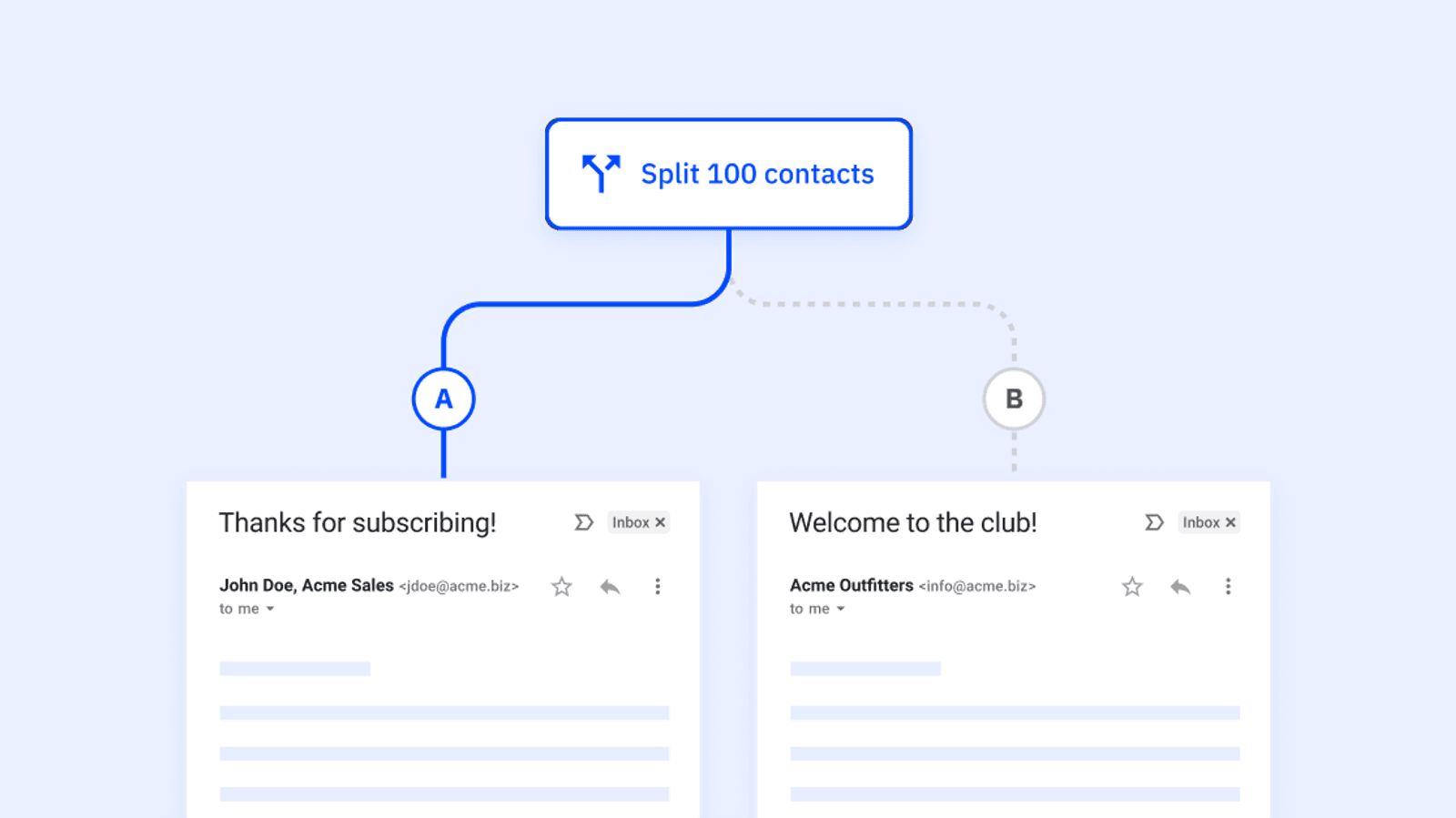“Pretend that every single person you meet has a sign around his or her neck that says, ‘Make me feel important.’ Not only will you succeed in sales, you will succeed in life.”
– Mary Kay AshThis post was updated on June 14, 2022.
If you had to walk up to someone on the street and sell them something using only yourself as a resource, could you do it? Do you have the skills to sell to anyone?
Even if you’re not a natural salesperson, the truth is that sales success is achieved through a variety of skills, not some rare, inexplicable gift. Whether you’re just getting started in sales or actively building a sales career, improving these skills will help you close more business.
This post will cover the top 16 skills you need to be a successful salesperson. You’ll learn what hard and soft skills are, which ones are most essential for success in sales, and how to teach yourself these valuable skills.
Table of Contents
Hard skills and soft skills for sales
Making sales requires you to access a wide range of skills between prospecting, cold calling, ongoing communications, and closing deals. For the most part, these skills are split into 2 types:
- Soft skills
- Hard skills
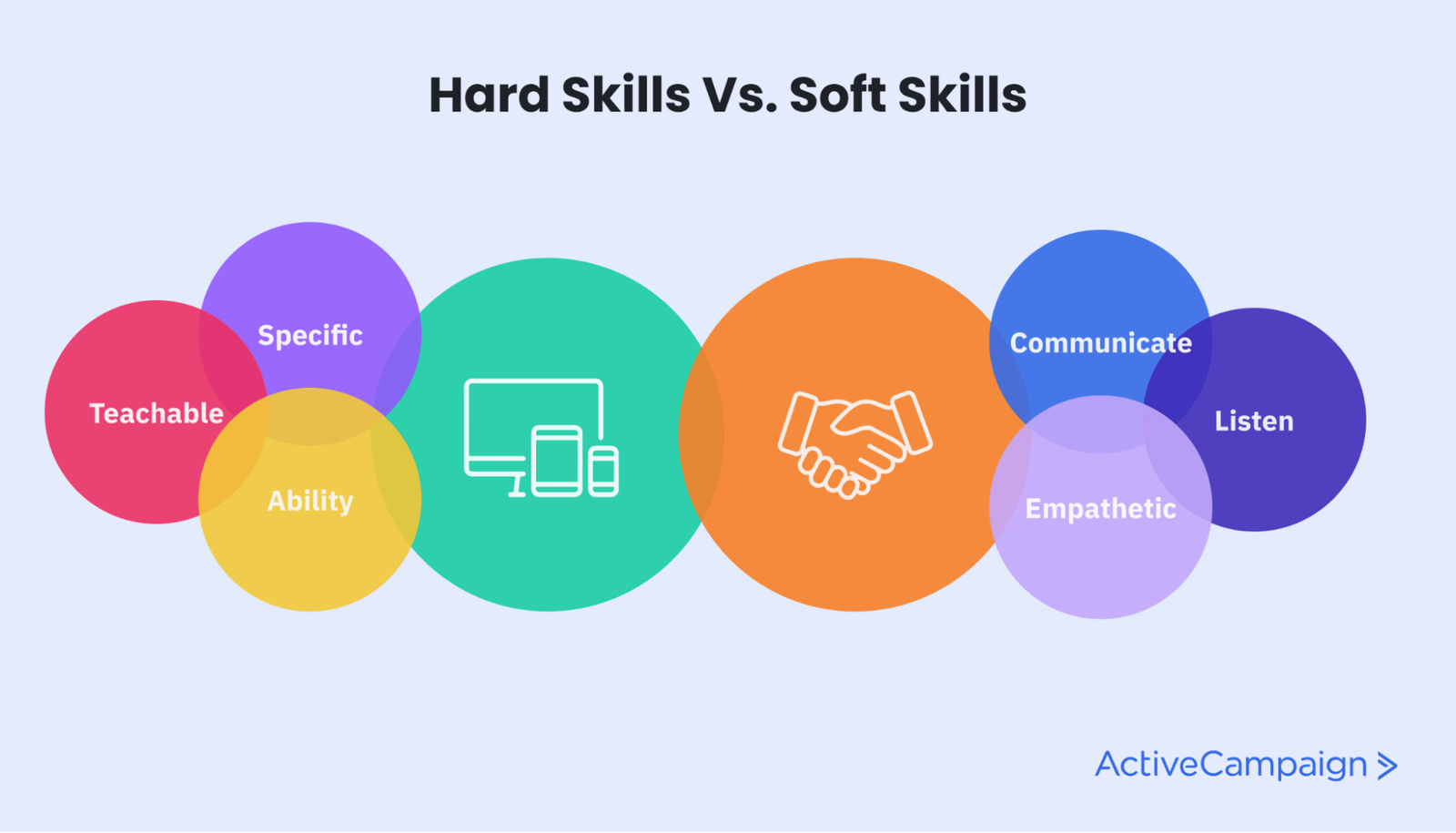
Soft skills are the types of skills we all learn over a lifetime. They refer to your mindset, attitude, behavioral tendencies, and ability to connect with people. These skills are naturally inherent and often feed into more specific hard sales skills—like time management.
Hard skills are more formal skills that you learn from academic institutions, workplaces, seminars, mentorships, and training courses. For sales, it would be a skill like product knowledge, which doesn’t come naturally to anyone as they live their lives.
Every sales professional who wants to succeed needs both hard and soft sales skills under their belt.
16 Sales skills you need to close deals
Soft Skills
- Trustworthiness
- Relationship-building
- Tenacity
- Self-awareness
- Emotional awareness
- Know when to stop talking and listen
- Be authoritative
- Active listening
- Eliminate the “um”
Hard skills
- Gathering info
- Being authoritative
- Product knowledge
- Objection handling
- Active listening
- Sales demo skills
- Closing skills
Soft sales skills
Part of the reason people often view sales as a function of personality is that it depends a great deal on your ability to relate to other people. While some people come naturally to these soft skills, they are still very learnable.
1. Trustworthiness
How do you build trust without losing a sales opportunity? Hint—it’s not from rattling off a list of features and benefits about a product. That just shows that you know how to memorize.
You earn trust when you answer prospect questions and give proof to back up your answers.
Social proof is powerful:
- 91% of people regularly read online reviews
- 84% trust online reviews as much as a personal recommendation
- 68% form an opinion after reading between 1 and 6 online reviews
Don’t just list what makes your product good when you are selling. Show prospects how your product solves their problem—and then follow up with social proof. This could be in the form of an online review or a customer story.
Build trust automatically.
2. Relationship-building
To get repeat business, you need to sell yourself. People want to do business with someone they trust.
You need to change how you think about your sales process to build relationships. New thinking = new results.
- Traditional Sales Outlook: Always deliver a strong sales pitch. Deliver a strong sales pitch right off the bat—no time for personal tangents If you're in a rush and afraid of making a strong sales pitch, use an AI sales pitch generator to make it strong.
- New Sales Outlook: Start a conversation before you start pitching. A personal connection triggers emotional reactions that lead to more trust (and more sales).
Relationship-building means learning who your prospects are as people—instead of thinking of them as another entry in your book of business.
Build relationships with integrated communications
Sales engagement automation is 1 way to nurture relationships with sales prospects by leveraging what you already know about them.
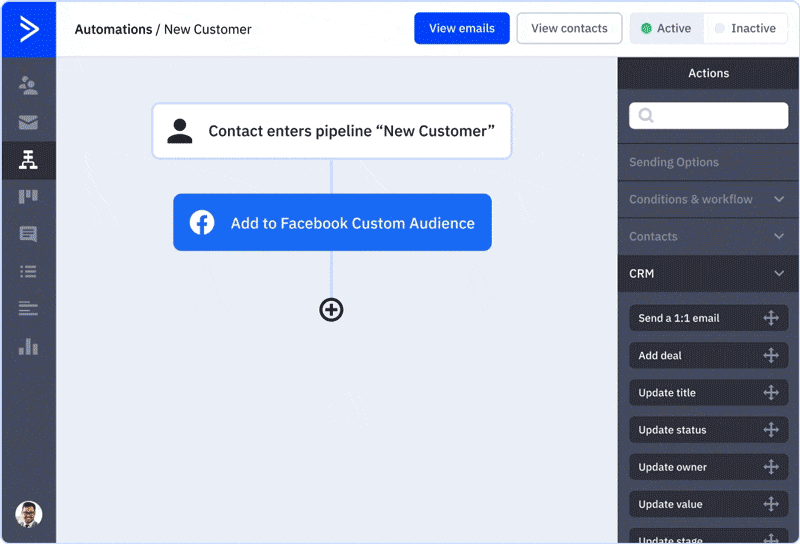
Social selling, in which you use social media to build relationships with potential customers, is another way to engage with your prospects. Learn more about using social selling and social prospecting in this article.
3. Tenacity
Tenacious: “to be persistent in maintaining, adhering to, or seeking something valued or desired.”
You know that rejection is part of the sales job description. You can offer a better product that you know is better than a competitor’s and still see a prospect choose them over you. That's why tenacity is such a critical sales skill.If you’re tenacious in the face of rejection, that rejection can evolve into a sale. Or, it often won’t turn into a sale. But part of the job is to get rejected a lot until you get sales.
If a prospect says no, it’s likely for 1 of 2 reasons:
- They aren’t ready for your offer
- They haven’t identified what their problems are yet
You have to be careful, however, in how you show tenacity. The best way to be persistent is to ask the right questions—rather than force info about what you’re selling. This way, you can tell why they’re giving you a “no” and turn it into a “yes.”
Tips for tenacity
Tenacity doesn’t mean going after everything with full energy at high speed. Tenacity means going after things that matter with everything you’ve got.
- Make lists of everything that’s challenging you and prioritize which ones you want to tackle
- Set measurable goals for yourself so you can track your progress. Seeing your results is a great motivator.
- Cut complaining out of your process. It’s disappointing when sales don’t work out, but negativity only brings you down. Take a minute to be bummed, then get back to work!
To learn how you can bring even more tenacity to your work, check out Grit: The Power of Passion and Perseverance by Angela Duckworth.
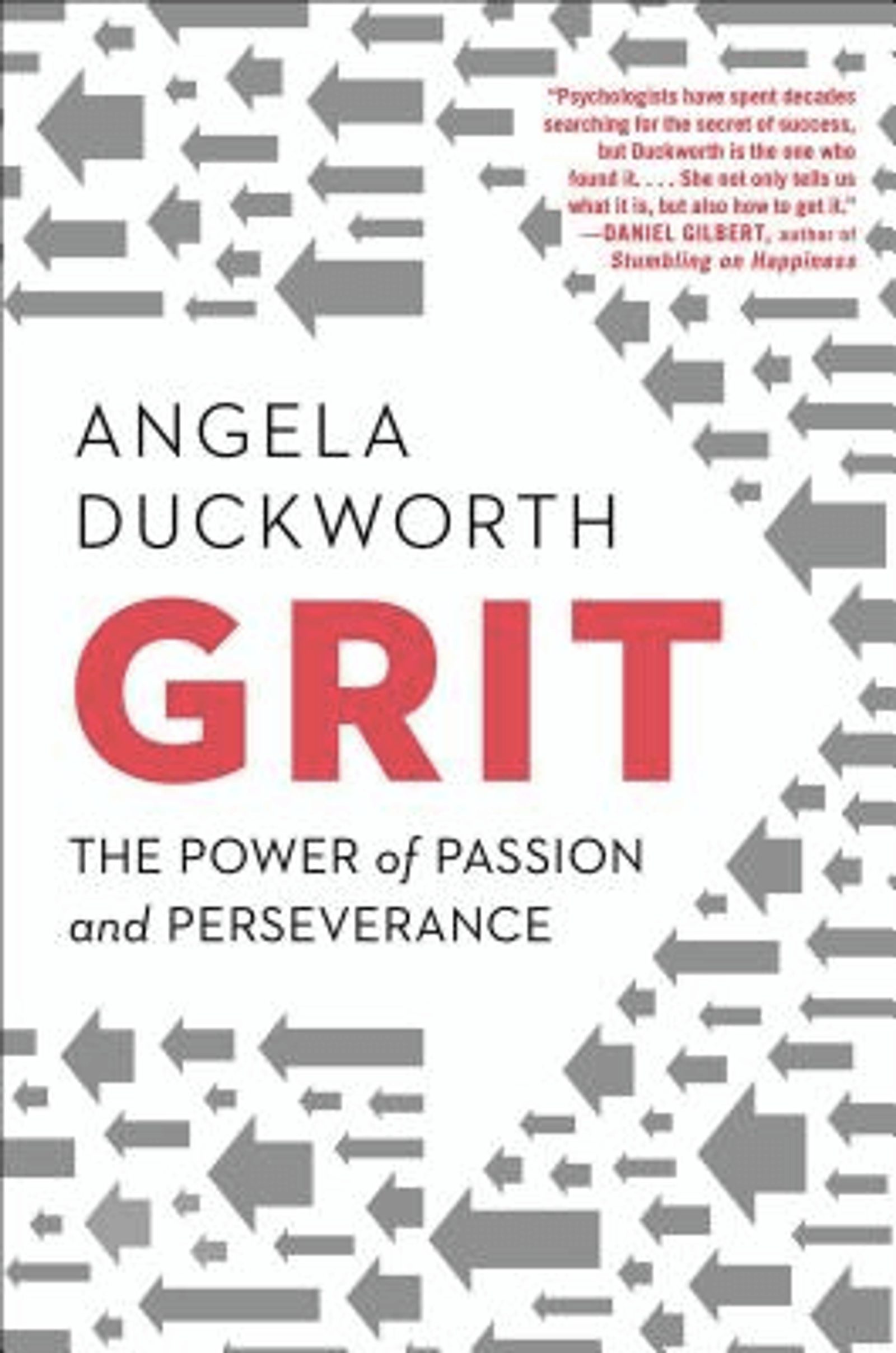
4. Self-awareness
One difference between a person who makes sales and who repeatedly doesn’t is self-awareness.
Self-awareness means you can see where you need to change your approach.
In his Harvard Business Review article, How Leaders Become Self-Aware, Anthony K. Tjan quotes:
Self-aware people can see situations that will make them successful and find ways to achieve their objectives that fit their inherent behavioral style.
How do you become more self-aware?
Pay attention and take notes during your sales calls. Your leads are the key to developing your self-awareness.
What kind of tone did their voice have? Frustrated? Curious? Confused?
Did they ask more questions or listen quietly most of the call? What does this mean?
Did they schedule a follow-up or say they’d “let you know at the end of the call?”
The answers to these questions are key indicators of where you might be going wrong in your sales cycle. Write it down and use these insights to tweak your approach and build better self-awareness.
5. Emotional awareness
Have you ever heard someone say, “people justify their purchases with logic, but they make decisions based on emotions?”
People use logic to defend a choice, but emotion is what makes the choice in the first place. Recognizing this is called emotional awareness.
When a lead buys from you, it’s because what you sell them solves a bigger problem or makes an already efficient process that much better.
If you push the logic of how a product perfectly fits their needs, it won’t be as effective as if you explain how good it feels to have a problem disappear because of your product.
What you should try: Put yourself in the buyers’ shoes. If you were getting pitched about a product, what emotional triggers would make you say yes? Write it down.
Boost your EQ
Learn how to improve your emotional intelligence (EQ) to close more sales.
6. Know when to stop talking and listen
When you immediately launch into a sales pitch focused on you and your product instead of the person you want to sell to, it’s a little like using a megaphone to talk over a crowd.
Just shut up and listen instead of diving right into a prepared spiel.
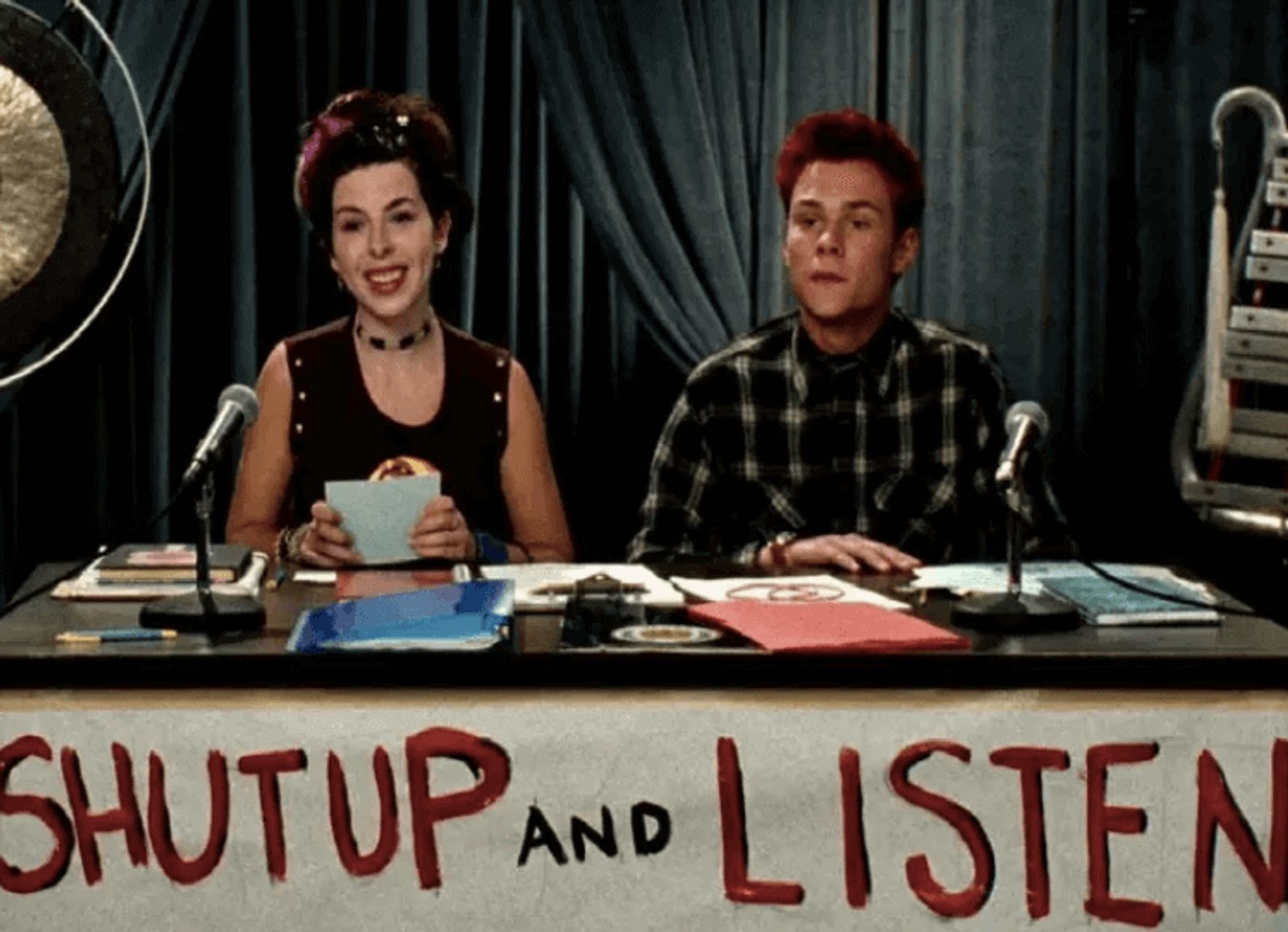
Listen to people on phone calls. Listen to people in their online reviews and comments on related content. Your sales pitch will be better when you create it based on the person instead of the product.
How do you know when to stop talking?
This is a hard skill to master. Your job is to sell, and when you pitch a product, you don’t want to leave anything out. Here are a few tips to help you listen a little better:
- Listen in on a fellow salesperson’s calls. If you aren’t the person who’s actually there to talk to a prospect, all you can do is listen.
- Practice a sales call with someone else. Get their feedback on where you can talk less and listen more.
- Ask for feedback after your calls. Include the question, “Is there something you want to discuss that we didn’t cover today?” Give them a place where they get to talk instead of you.
7. Be authoritative
If you don’t show confidence in yourself and your product, why should anyone else? You’re smart enough to know that you can’t serve everyone, but an authoritative attitude will open conversations with the people you want to sell to.
Being an authoritative sales representative can mean a few things:
- Product knowledge: How a product benefits them and how it rises above competing products in your industry.
- Industry knowledge: How your product scales with the trends and changes in the niche product industry.
- Audience knowledge: Who is best suited to get results from your product—and why.
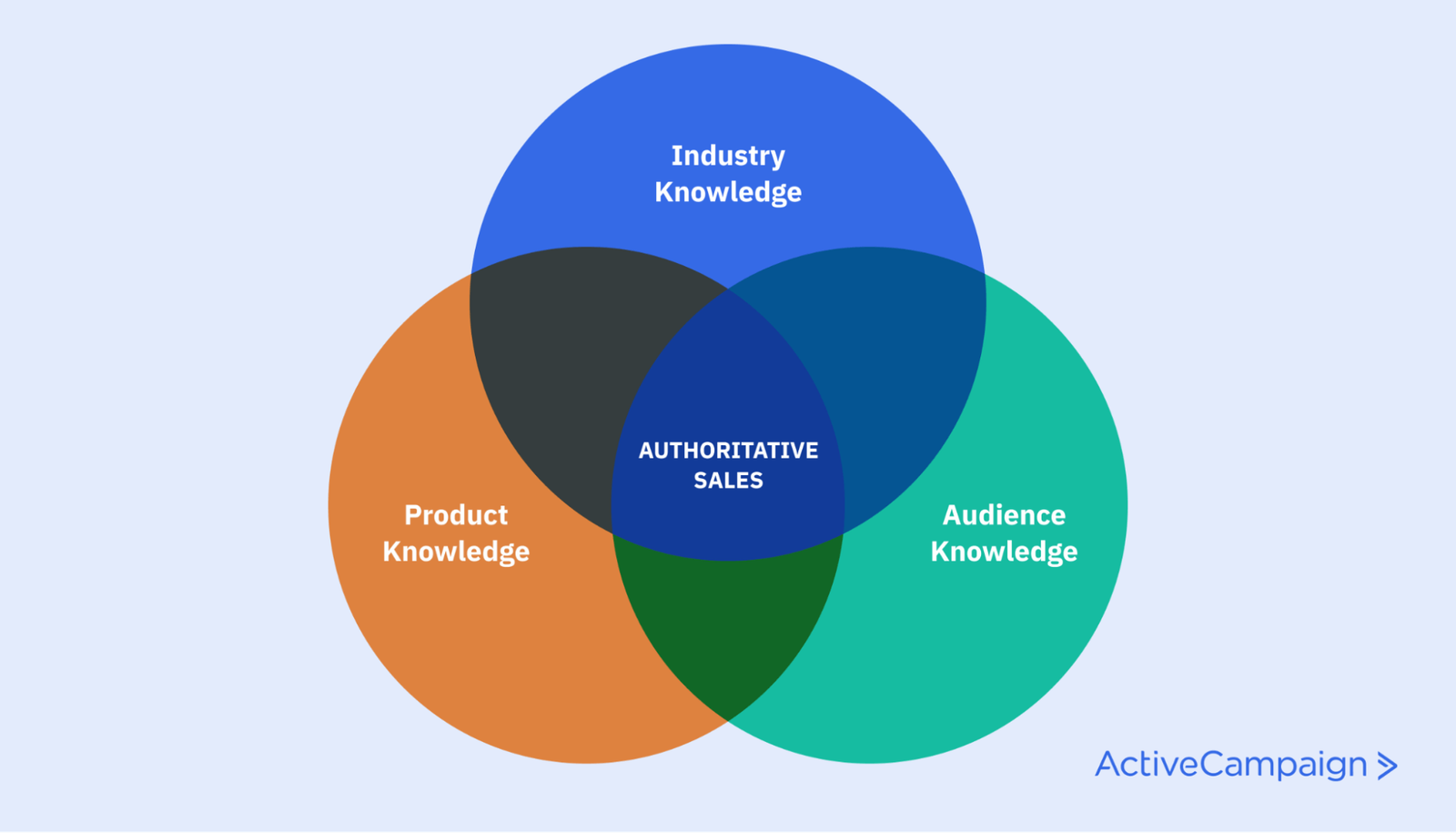
Listening plays a role in all of these sales skills. It helps you become an authoritative sales representative (and feel like one, too).
How to become more authoritative
Here are a few tips on how to develop a more authoritative sales approach:
- Don’t worry about being liked. Yes, you want the prospect to like you, and cultivating a good relationship is very important. But you first and foremost want them to like your product.
- Pay attention to your tone of voice. If you’re unsure of an answer or getting frustrated, don’t let them know it.
- Have an answer when you don’t have an answer. You can still respond with confidence when you’re thrown a question from left field. Try phrases like, “You’ve given me a lot to think about, so let me get back to you” or “I appreciate you asking this, and I’ll think it over.”
8. Active listening
Sometimes we hear but don’t listen. Many sales reps are comfortable talking to prospects, but listening is another matter. If listening is hearing the sound, active listening is processing the sound.
People can tell if you’re not listening to them, leading them to someone who will—who isn’t you. Active listening in sales lets you get clear information from your clients, build rapport, and show that you care about their concerns. Great listening skills are vital for emotional intelligence and can help salespeople empathize with potential customers and their pain points. That knowledge will help you sell more effectively.
Top active listening tips
Some widely-regarded active listening techniques are:
- Showing concern
- Paraphrasing to show you understand
- Waiting to share your opinion until you have all the info
- Asking both specific and open-ended questions
- Nonverbal cues like nodding, eye contact, and leaning forward
- Short, verbal affirmations like “I see” or “I understand”
- Sharing similar experiences to show understanding
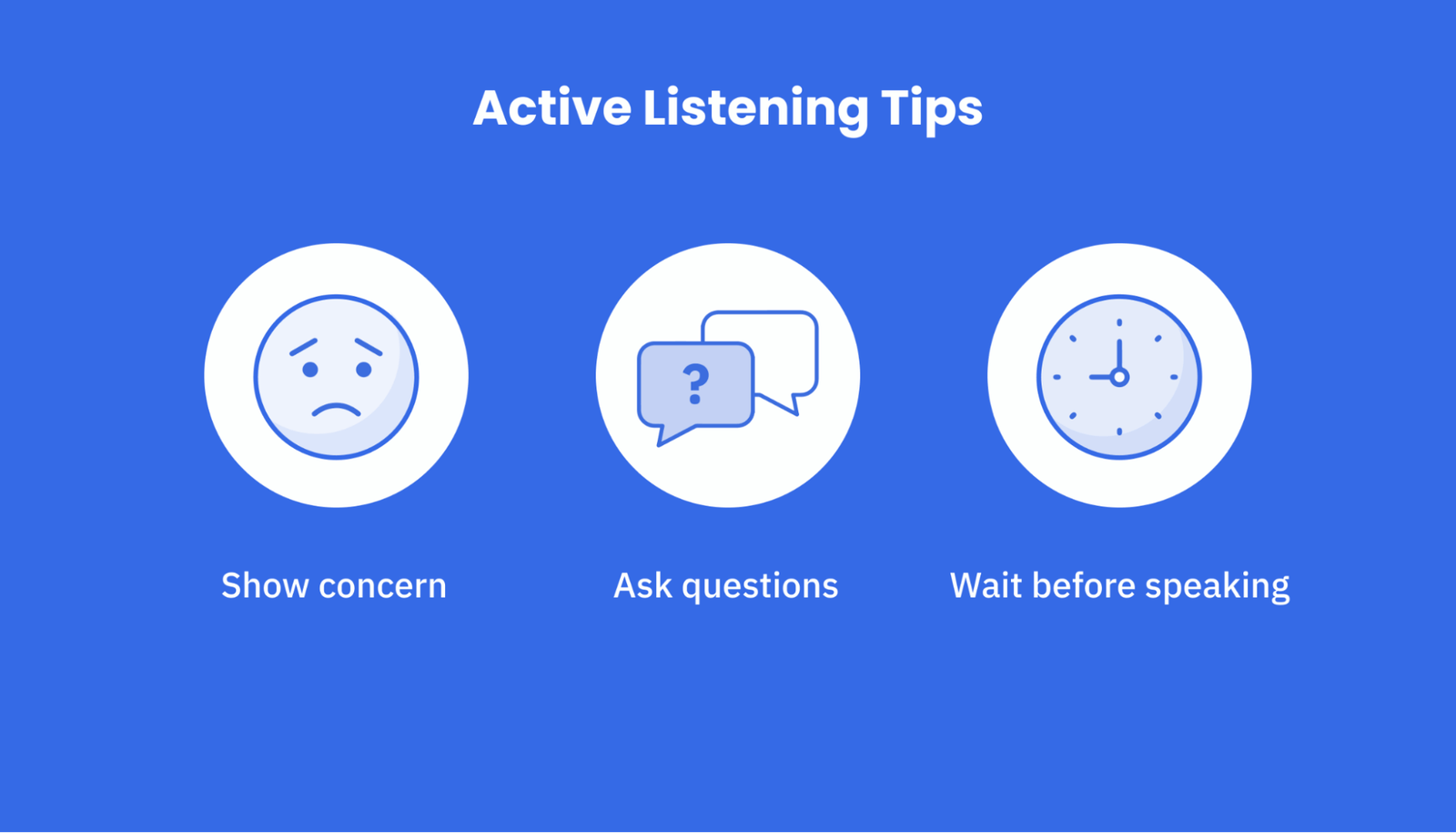
9. Eliminate the “um”
“Um” is the not-so-silent sales killer.
A prospect is in the sales process to learn from you, and this little word—when used too much—can make you sound like you don’t know what you’re talking about.
Do you want to know the best thing you can do instead of umm-ing? Be silent. Take a brief pause.
Even though it might feel awkward to say nothing during a pause, actively choosing silence is a better alternative than filling the space with something that doesn't bolster the content or your credibility. Also, silence feels longer to you than to the person you’re talking to.
Taking pause has other benefits, including:
- Give the prospect time to process the information
- Help you pace yourself (especially if you tend to talk fast when nervous)
- Give you a moment to get your thoughts in order
Practice cutting “um” from your vocabulary
Test this out in your everyday life to get better at it. During your next meeting or lunchtime chat, track how often you say “um” and think about consciously taking a breath to force a pause. This will strengthen your sales pitch and your public speaking skills.
Hard sales skills
Along with soft skills, great salespeople also develop more formal and specific abilities. They learn the facts and systems that allow them to apply their soft skills best.
10. Time management
This is probably not new for you, but always worth mentioning. Why? Because everyone has moments where they slip up.
The sales process is a time investment as much as it is a financial one, and you need to use it wisely.
Both your and your client’s time is important. Consciously taking action to manage your time with sales automation and marketing stack tools helps improve productivity and cost-efficiency.
Here are some tips for using your and your client’s time most efficiently:
- Set call agendas. When you schedule a sales call, have a list of questions you want to ask (and answers to the questions you anticipate getting). If it’s early in the process, leads might not know where to start the conversation, so be prepared to start it for them—and share the agenda, so they are prepared, too.
- Use a CRM to stay organized. A CRM (customer relationship management) tool helps keep all of your prospects organized based on where they are in your sales cycle.

Time management tips to try
- Make a list. Itemize your daily tasks from most urgent to least urgent—and how much time you estimate each task takes.
- Block time on your calendar. No, not just in your mind. Actually get a calendar and block out the time with a labeled task. Sometimes your priorities change, but a physical (or digital) schedule gives you a leg up on your day.
- Take an hourly break. Just for 5-10 minutes. Stop where you are and reset your mind with a walk, snack, or sales conversation. When you come back, you can refocus on your top priority.
11. Gathering info
How do you sell to someone you don’t know? It’s tough.
Luckily, digital technology gives us access to tons of customer info that better prepares us to know what’s going to convince them to sign on the dotted line.
Where can you gather your research?
- Your sales CRM
- Competitor websites
- Online reviews
- Social media
- A client intake form
You can gather info about:
- What they like
- What they hate
- Their biggest struggle
- What they’ve already tried to fix a problem
- Something they want
All these details should be documented in your CRM's customer or contact profiles. This allows you (and your colleagues) to perfectly tailor your outreach and engagement.
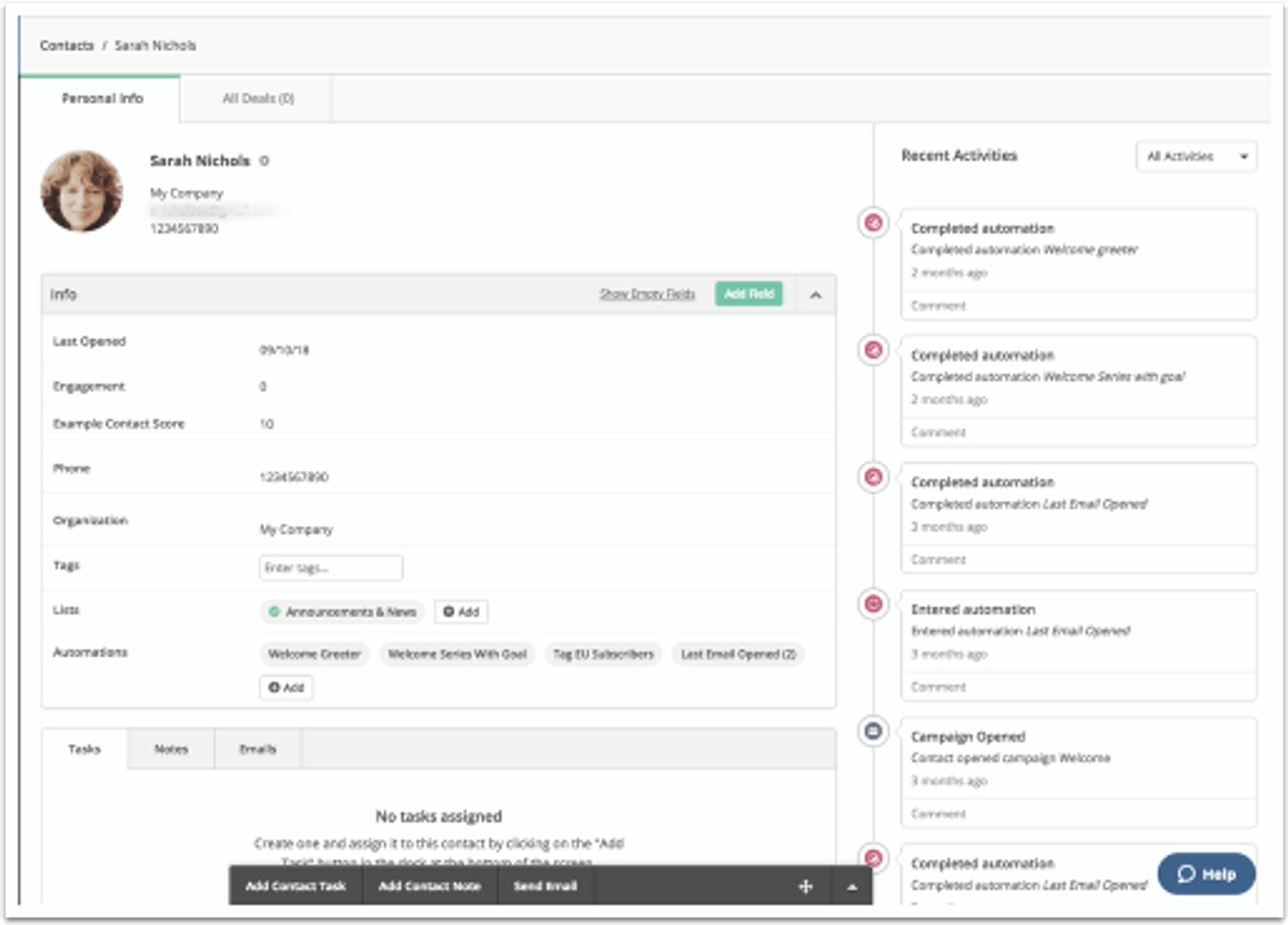
We did the research on how to research
To learn exactly how to research (and engage) a new sales lead effectively, check out our blog on How to Follow up with Prospects.
12. Storytelling
Everyone loves a good story. Why?
- Stories are relatable
- Stories offer affirmation of your thoughts and decisions
- Stories open your mind to new ideas
- Stories trigger emotional responses
Do you know why the TED conference gets so many attendees? Because TED talks are never just about what they’re about. The speakers tell stories to sell you an idea and make you feel why it’s important to your life to know the information.

An exceptional salesperson can do the same by telling stories.
Develop your storytelling skills
Buying is an emotional process first and a logical process second. Try writing a customer story about why a current customer became a client. This accomplishes 2 things:
- Writing the process in a story form helps you speak more naturally about a long-term relationship with your business, not just a one-time sale.
- Writing down a customer story gives you a tangible resource to share with prospects. This type of social proof can be a deciding factor for a lead.
13. Product knowledge
Any sales representative who tries to sell without having an intimate knowledge of their product's features, benefits, and weaknesses will not be successful.
Show that you are a product expert to create trust among your prospects.
How to become a product expert
To know your product, you have to learn about your product. Here’s how:
- Schedule time for your own product demo and see exactly how everything works for yourself. Also, do it more than once. Refresh your memory regularly.
- Gather helpful resources like guides or blogs to get more clarification. You can also save these to share with your prospects during a demo.
- Do a mock demo for someone else. Put your product knowledge skills to the test and take someone you know through a demo. Have them ask questions to make sure you’ve got answers for everything.
14. Objection handling
Objection handling is when a prospect presents a concern about the product a salesperson is selling, and the salesperson assuages those concerns.
Sales representatives need to learn to sincerely understand the prospect’s problem, ask for more information, and offer resources to help the prospect overcome their objections.
Objections can be about anything, but the most popular points of contention are:
- Price
- Product features
- Competitors
Learn how to handle objections
Role-playing with your sales team can make actual prospect objections much easier to handle confidently. A couple of other objection handling tips are:
- Speak slowly, calmly, and confidently. In a typical sales conversation, the average talking speed is 173 words per minute. But when flustered by a sales objection, a bad sales rep will speed up to 188 words per minute. Take a second and take a deep breath before you respond. Give yourself a moment to form an answer.
- Try mirroring. In his book Never Split the Difference, Chris Voss talks about this objection handling technique. Here’s what you do: Repeat the last few words of your buyer’s sentence. And do it with an upward voice tone (like you’re asking a question). It triggers your buyer to elaborate.
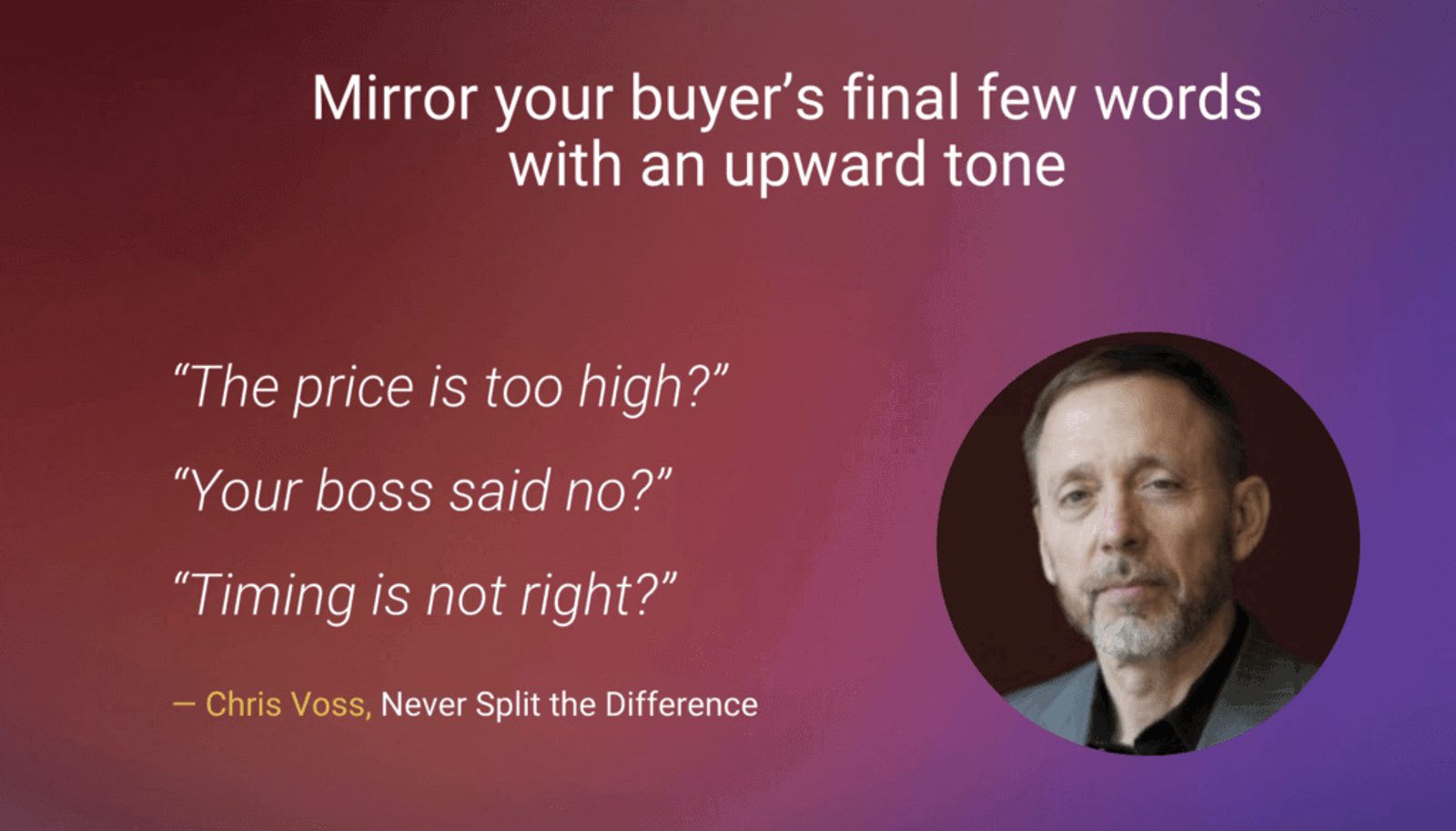
15. Sales demo skills
A sales demo shows the prospective customer exactly what they get when buying from you. They learn what a product is, how to use it, and why to use it. Yes, you talk about these things in the early calls, but now your sales demo gives them proof.
People want proof. It’s that simple.
To pull off the perfect sales demo, you can use resources like:
- Videos
- Content
- Help guides
- Presentation tools
Excellent sales demos show subject expertise and build trust around your business.
How to give better demos
Whatever your industry or product, try these tips to improve your demo.
- Customize the demo to the prospect. Before you start any kind of spiel, ask the person what their primary interests are and what they want to get out of using your product. Tailor your demo to those needs.
- Don’t do a “just-in-case” demo. It’s tempting to include absolutely everything about your product right away, but rattling off every little thing can be overwhelming. Highlight the most important things to talk about, listen to the questions they ask, and prepare questions to ask them. They will tell you what else they want to know.
- Take your time. Rushing makes you feel stressed and often leaves a prospect confused. If you don’t have time to cover everything with a single demo, that’s ok! It gives you room to schedule another call and keep the conversation alive.
16. Closing skills
You’re at the moment when a prospect finally realizes, accepts, and buys (literally). How do you make sure that the deal closes?
Discuss next steps immediately after a demo.
Talk through the process of officially onboarding them as a customer. Be clear about:
- Who they need to talk to on their end to get final approval
- What kind of timeline to expect for next steps
- When you’ll schedule a follow-up call
Also, schedule a follow-up before the call ends. Make sure that the next steps you and the prospect are discussing have a scheduled start date.
How to become a better closer
The best thing you can do to build this skill? Practice in the mirror. You might feel silly, but watching yourself finish your pitch can show you how you come off to the person on the call.
Start developing your sales skills
Salespeople develop and use a ton of different skills. To get started, consider choosing just 1 or 2 to focus on. Of course, the best way to learn and master your skills is to put them to the test. Research only takes you so far; experience will drive home these lessons and help your sales pitch become more natural and appealing.
Still, a little extra research to bolster your efforts can only help. To that end, here are a couple of tried and true resources to hone your sales prowess.
Book: To Sell Is Human by Daniel Pink
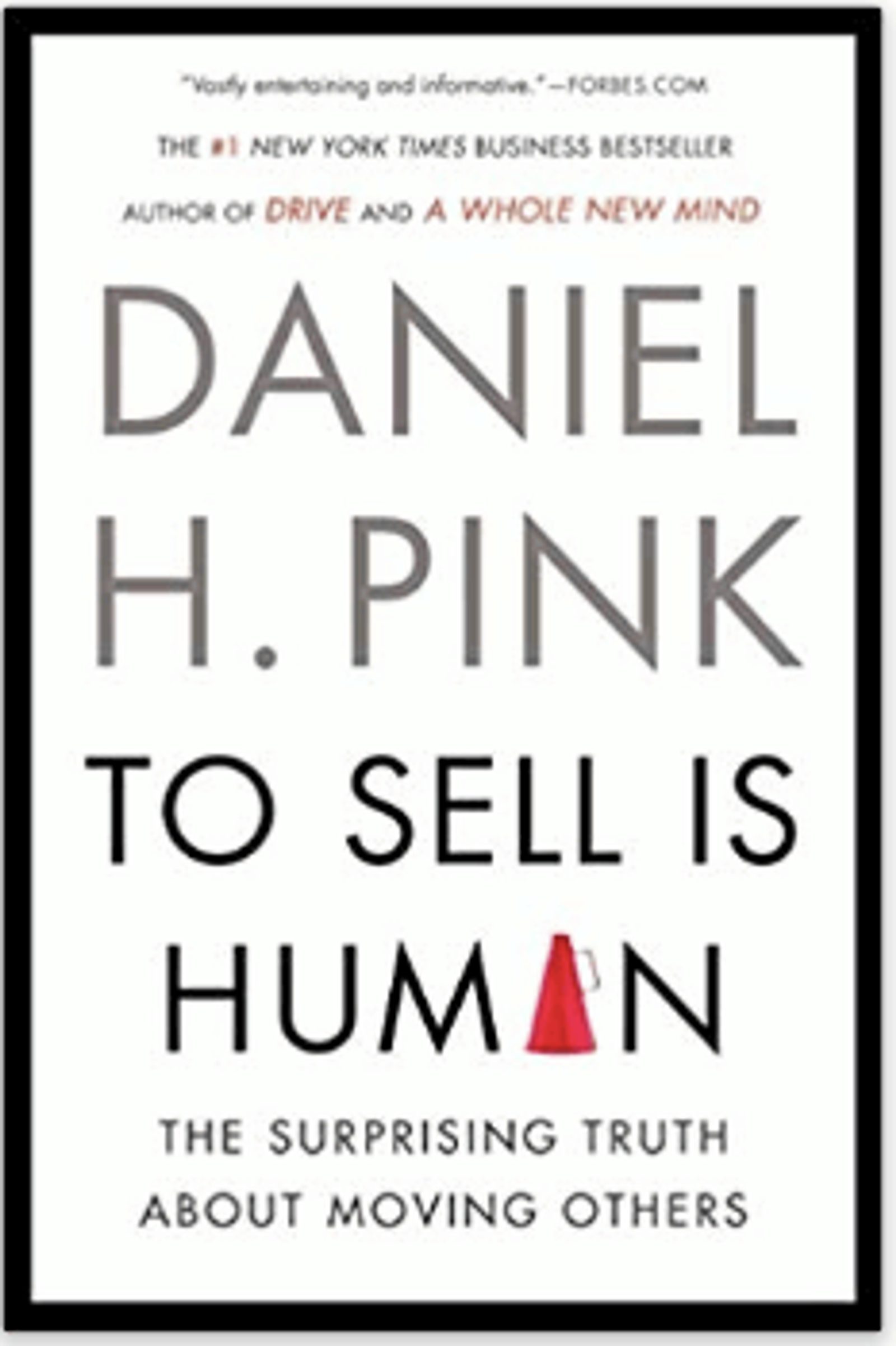
Pink says that moving people (AKA selling while also persuading or influencing) is an essential part of nearly everyone’s job in the modern workplace. Everyone is in sales.
Whatever your line of work is, your success depends on how well you can “move people”—get them to part with their resources—like time, money, and energy—in exchange for some value you can provide. It’s undeniably true for a dedicated salesperson.
Book: How To Win Friends and Influence People by Dale Carnegie
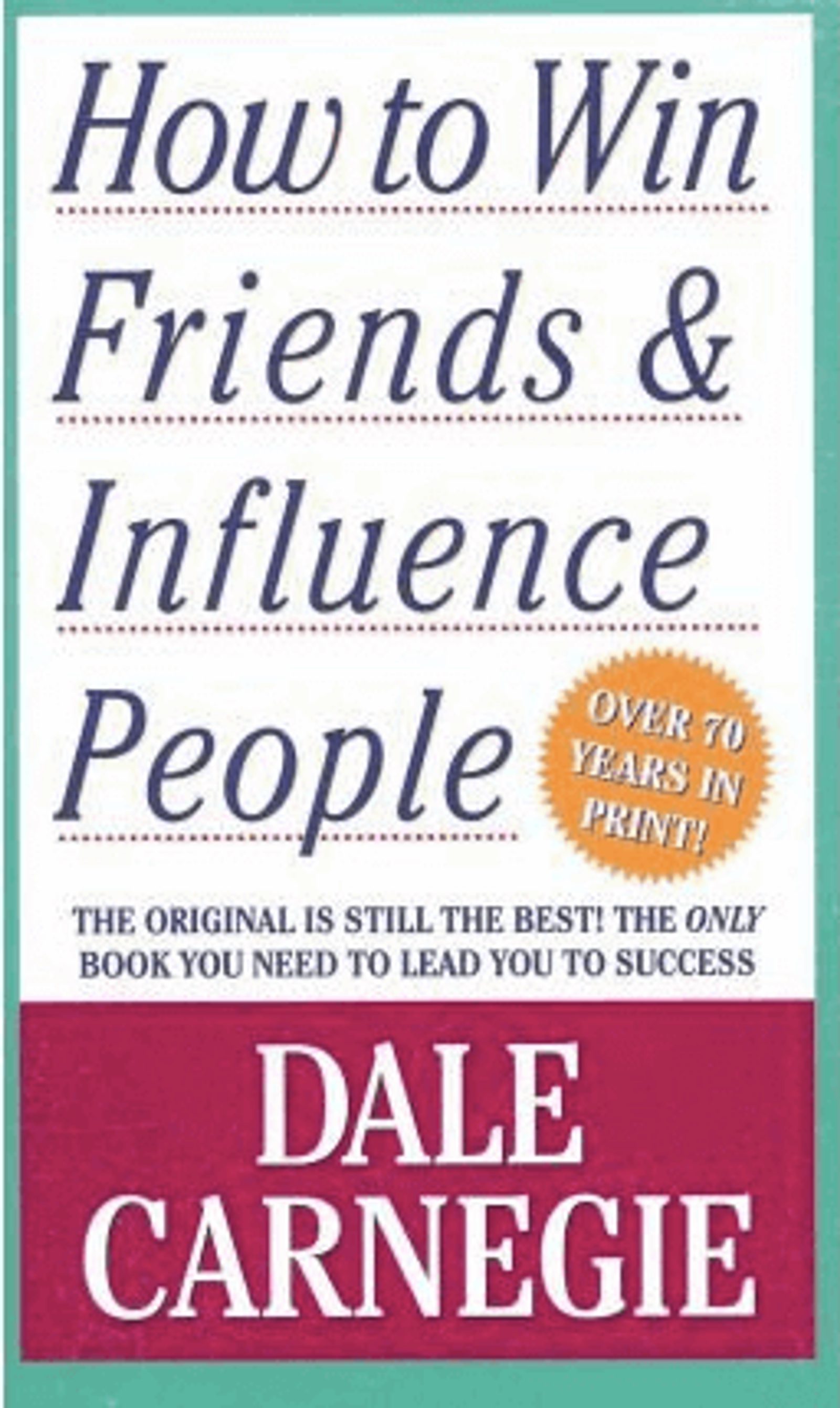
Dale Carnegie wrote this book in 1936, but the lessons still apply in today’s world. The entire book is basic, common-sense principles—principles we have all heard or been taught at some time but are easy to forget in day-to-day life. It is about how to care about other people and show them that you care.
It teaches lessons like:
- Become genuinely interested in other people
- Begin in a friendly way
- Praise every improvement





